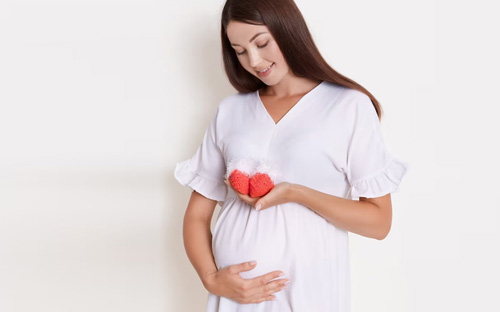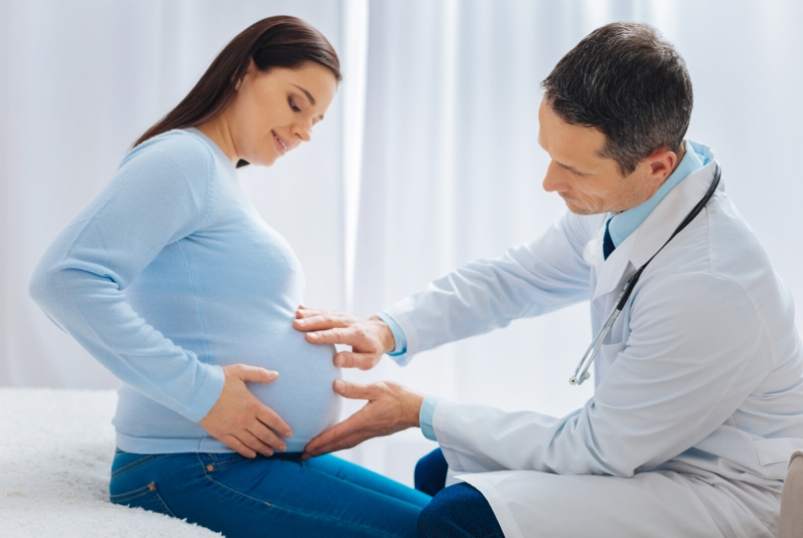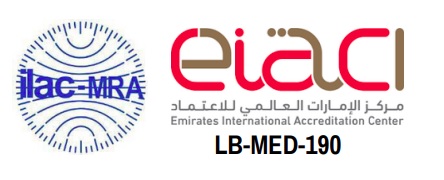NIPT TEST
Non-invasive Prenatal Testing - NIPT TEST

NIPT TEST from AED-1299/-
Non-invasive Prenatal Testing - NIPT TEST
- Simple & Safe blood test
- >99% accuracy
- Faster result from 10 to 15 days.
- Efficient - multi syndrome detection

Panorama NIPT Standard AED 2200/-
Ramadan Offer Now worlds best Most Premium NIPT AED-1650
Offer Valid till 30 April 2024
The Most advanced, only SNP-based NIPT delivers more insights and greater accuracy
- The only NIPT which uses SNP*-based technology
- Delivers the most accurate NIPT report
- Test result with in 8-10 days
- Can be tested at earliest as 9 weeks.

Panorama NIPT Standard + all 5 microdeletions AED 3500/-
Ramadan Offer Now worlds best Most Premium NIPT AED-2500
Offer Valid till 30 April 2024
The Most advanced, only SNP-based NIPT delivers more insights and greater accuracy
- The only NIPT which uses SNP*-based technology
- Delivers the most accurate NIPT report
- Test result with in 8-10 days
- Can be tested at earliest as 9 weeks.
Special Ramadan OFFER!!
World's Best More Premium NIPT now at Affordable Price AED-1650/-
As we are the authorized dealer of Natera USA. With their support we are offering Worlds Best Most Premium Vigorously Validated Reliable Most Accurate NIPT test in the world which is using the superior SNP technology NIPT at a very affordable price. Use this offer to get tested from a reliable and trust worthy brand
Offer Valid till 10-April-2024
Booking Dates 23-March-2024 till 30-April-2024 | Testing Until 31-Dec-2024
Comparison Of NIPT test
| Test Name | Panorama AI NIPT Popular NIPT Test | NIPS (NIPT) by NGS | NIPT-23 |
| Weeks | >9 weeks 0 days | >10 weeks 0 days | >10 weeks 0 days |
| Reports | 10 to 12 days | 12 to 15 days | 10 to 12 days |
| Down Syndrome (trisomy 21) |  |  |  |
| Edward Syndrome (trisomy 18) |  |  |  |
| Patau Syndrome (trisomy 13) |  |  |  |
| Triploidy |  |  |  |
| Sex Chromosome Aneuploidy X0, XXX, XXY, XYY |  |  |  |
| Fetus Gender |  (Zero Error) (Zero Error) |  |  |
| Identify Twin Baby Gender Seperately |  (Boy,Boy; Boy,Girl; Girl,Girl) (Boy,Boy; Boy,Girl; Girl,Girl) |  |  |
| DiGeorge syndrome (22q11.2 deletion) |  (@ Additional charges) (@ Additional charges) |  (@ Additional charges) (@ Additional charges) |  (@ Additional charges) (@ Additional charges) |
| Additional 4 Microdeletions |  (@ Additional charges) (@ Additional charges) |  (@ Additional charges) (@ Additional charges) |  (@ Additional charges) (@ Additional charges) |
| SNP technology |  |  |  |
| AI technology |  |  |  |
| Identify Mom & Baby DNA separately |  |  |  |
| Free Genetic Counselling Session |  |  |  |
| Price in AED | 2,200/- Ramadan Offer AED-1650 Offer Valid till 30-April-2024 | 1299/- | 2,400/- |
Panorama Next-Gen NIPT Test. As early as 9 weeks.
Panorama is the most advanced NIPT test which uses the SNP based technology to delivers results with more insights and greater accuracy. This is the most rigorously validated NIPT Test Get free Genetic information sessions before and after the test to clarify all your doubts regarding the test and result.
Panorama Next-Gen NIPT Test
| Test Parameters | panorama NIPT Standard AED-2500 AED 2200 | panorama NIPT Standard + 22q11.2 deletion AED-3000 AED 2500 | panorama NIPT Standard + all 5 microdeletions AED-3800 AED 3500 |
| Down Syndrome (trisomy 21) |  |  |  |
| Edward Syndrome (trisomy 18) |  |  |  |
| Patau Syndrome (trisomy 13) |  |  |  |
| Triploidy |  |  |  |
| Turner syndrome (monosomy X) |  |  |  |
| XXX syndrome (47,XXX) |  |  |  |
| Klinefelter syndrome (47,XXY) |  |  |  |
| Jacobs syndrome (47,XYY) |  |  |  |
| Fetus Gender |  |  |  |
| DiGeorge syndrome (22q11.2 deletion) |  |  |  |
| 1p36 deletion syndrome (1p36 deletion) |  |  |  |
| Wolf-Hirschhorn syndrome/4p- syndrome (4p16.3 deletion) |  |  |  |
| Cri-du-Chat syndrome/5p- syndrome (5p15.2 deletion ) |  |  |  |
| Prader-Willi and Angelman syndromes (15q11.2-q13 deletion) |  |  |  |
NIPT 23
| Test Parameters | NIPT23 SAGE Standard AED- 2400 | NIPT23 SAGE Plus AED-3500 |
| Down Syndrome (trisomy 21) |  |  |
| Edward Syndrome (trysomy 18) |  |  |
| Patau Syndrome (trisomy 13) |  |  |
| sex chromozome aneuploidy Turner syndrome (mX), Klinefelter syndrome (XXY), XYY & XXX Syndrome |  |  |
| Fetus sex |  |  |
| Other Chromosome Aneuploidies |  |  |
| Microdeletions DiGeorge Syndrome, 1p36 Deficiency Syndrome, Pride Wiley Syndrome (Square Willy Syndrome), Ang Joman’s Syndrome (Angel Syndrome), Cat Cry Syndrome, and Wolf-Hew Hung’s Syndrome. |  |  |
Conditions Screened For
Panorama screens for common genetic conditions that are caused by extra or missing chromosomes in the baby’s DNA. Because Panorama uses a unique technology to truly distinguish between the mother’s and the baby’s DNA, it is the only NIPT test that screens for triploidy, and it has the highest accuracy in determining the gender of the baby (optional). Some conditions, such as Down syndrome, are caused by extra copies of a specific chromosome. Others, such as microdeletions, occur when a chromosome is missing a small piece of genetic information. Microdeletions affect pregnancies equally, regardless of maternal age.
TRISOMIES
Trisomy 21 (Down Syndrome)
XY CHROMOSOME ABNORMALITIES
Monosomy X (Turner Syndrome)
MICRODELETIONS*
Babies with Down syndrome have three copies of chromosome 21 and have intellectual disabilities that range from mild to severe. Children with Down syndrome will need extra medical care depending on the child’s specific health problems. Early intervention has allowed many individuals with Down syndrome to lead healthy and productive lives. The presence of medical conditions, like heart defects, can affect the lifespan in these children and adults; however, most individuals with Down syndrome will live into their 60s. Miscarriage occurs in about 30% of pregnancies with Down syndrome while overall about 1 in 700 babies are born with Down syndrome.
Trisomy 18 (Edwards Syndrome)
Babies with trisomy 18 have three copies of chromosome 18 and have severe intellectual disabilities and birth defects typically involving the heart, brain, and kidneys. Babies with trisomy 18 can also have visible birth defects such as an opening in the lip (cleft lip) with or without an opening in the roof of the mouth (cleft palate), a small head, clubbed feet, underdeveloped fingers, and toes, and a small jaw. Unfortunately, most pregnancies with trisomy 18 will miscarry. If born alive, most affected babies with trisomy 18 will pass away within the first few weeks of life. About 10 percent survive to their first birthday. Trisomy 18 occurs in approximately 1 in 3,000 live births.
Trisomy 13 (Patau Syndrome)
Babies with trisomy 13 have three copies of chromosome 13 and have severe intellectual disabilities. They often have birth defects involving the heart, brain, and kidneys. Visible abnormalities include extra fingers and/or toes or an opening in the lip, with or without an opening in the palate. Given the severe disabilities, most pregnancies affected by trisomy 13 will miscarry. If born alive, most affected babies with trisomy 13 will pass away within the first few weeks of life. About 10 percent survive to their first birthday. Trisomy 13 occurs in approximately 1 in 5,000 live births.
Babies with monosomy X are females who have one X chromosome instead of two. Unfortunately, a high proportion of pregnancies with monosomy X will result in a miscarriage in the first or second trimester of pregnancy. Babies with monosomy X that make it to term may have heart defects, learning difficulties, and infertility. In most cases, girls with monosomy X will need extra medical care including hormone therapy at various stages of life.
Klinefelter Syndrome
Boys with Klinefelter syndrome have an extra X chromosome (XXY). This condition can be associated with learning difficulties and behavioral problems. Men with Klinefelter syndrome may be infertile. About 1 in 1,000 babies will be born with Klinefelter syndrome.
Triple X Syndrome
Girls with Triple X syndrome have an extra X chromosome (XXX). Girls with this condition may be taller than average and may experience learning difficulties or behavioral problems. Approximately 1 in 800 girls will be born with an extra X chromosome.
Jacob's Syndrome
Boys with Jacob’s syndrome have an extra Y chromosome (XYY). Most babies with XYY syndrome do not have any birth defects. Boys with XYY may be taller than average and have an increased risk for learning, speech, and behavioral problems. Approximately 1 in 650 boys will be born with an extra Y chromosome.
22q11.2 deletion Syndrome
22q11.2 deletion syndrome, also called DiGeorge syndrome or Velo-Cardio-Facial syndrome (VCFS), is caused by a missing piece of chromosome number 22. About one in every 2,000 babies is born with 22q11.2 deletion syndrome. The majority of children with this disorder have heart defects, immune system problems, and specific facial features. Most children with 22q.11.2 deletion syndrome have mild-to-moderate intellectual disability and speech delays; some will also have low calcium levels, kidney problems, feeding problems, and/or seizures. About one in five children with 22q11.2 deletion syndrome have autism spectrum disorder; 1 in 4 adults with 22q11.2 deletion syndrome have a psychiatric illness, like schizophrenia.
Prader-Willi syndrome (PWS)
Prader-Willi syndrome occurs when either a small piece of chromosome 15 is missing or when both copies of chromosome 15 come from the same parent (called uniparental disomy, or UPD). Babies with Prader-Willi syndrome have low muscle tone and problems with growth and feeding. Children with Prader-Willi syndrome have delayed milestones, short stature, rapid weight gain leading to obesity, and intellectual disability. About 1 in 10,000 babies are born with Prader-Willi syndrome.
Angelman Syndrome
Angelman syndrome happens when either a small piece of chromosome 15 is missing, or when both copies of chromosome 15 come from the same parent (called uniparental disomy, or UPD). About 1 in 12,000 babies are born with Angelman syndrome. Babies and children with Angelman syndrome have severe intellectual disability, delayed milestones, seizures, and problems with balance and walking.
1q36 Deletion Syndrome
1p36 deletion syndrome, also referred to as Monosomy 1p36 syndrome is caused by a missing piece of chromosome 1. Children with 1p36 deletion syndrome have intellectual disabilities. Most have heart defects and weak muscle tone. About half of affected individuals have seizures (epilepsy), behavioral problems, and hearing loss. Some children with 1p36 deletion syndrome also have vision problems or additional birth defects of other organs. About 1 in 5,000 newborn babies has 1p36 deletion syndrome.
Cri-du-chat Syndrome
A missing piece of chromosome 5 causes Cri-du-chat syndrome, also called 5p- (5p minus) syndrome. The name “Cri-du-chat” was given to this syndrome due to the high-pitched, cat-like cry that babies with this syndrome often make. Babies with Cri-du-chat syndrome typically have low birth weight, a small head size, and weak muscle tone. Feeding and breathing problems are common in infancy. Children with this disorder have moderate-to-severe intellectual disability, including speech and language delays. They may also have growth delays, behavior problems, and some have curvature of the spine (scoliosis). About one in every 20,000 babies is born with Cri-du-chat syndrome. They may also have heart defects, growth delay, behavior problems and some have curvature of the spine.
Limited Scope
It’s important to note that the NIPT test has limitations in terms of its scope. It primarily serves as a screening test for common chromosomal abnormalities and does not provide information about other genetic disorders or birth defects. False-positive and false-negative results are also possible, and positive results require confirmation with invasive diagnostic testing.

Microdeletions screened in NIPT test
Microdeletions are chromosomal abnormalities characterized by the loss of a small piece of genetic material from a chromosome. In the context of NIPT, microdeletions refer to the detection of certain specific microdeletion syndromes during prenatal screening. These syndromes involve the absence of a small segment of genetic material, typically ranging from a few kilobases to several megabases.
The comprehensive NIPT that screens for a range of chromosomal abnormalities, including certain microdeletion syndromes. Some of the common microdeletion syndromes that may be screened by NIPT include:
1p36 deletion syndrome
It is a genetic syndrome characterized by birth defects, intellectual disability, and other serious medical issues. 1p36 deletion syndrome is caused by a deletion in the region of 1p36. Key features of this syndrome include: characteristic craniofacial features, intellectual disability, seizures, skeletal abnormalities, and brain and heart defects. Lifespan is variable, but can be normal.
4p- syndrome
This is a rare genetic syndrome characterized by birth defects, intellectual disability, and other serious medical problems. 4p- syndrome is caused by a deletion in the region of 4p16.3. Key features of the syndrome include: prenatal-onset growth deficiency followed by postnatal growth retardation and hypotonia with muscle underdevelopment, typical craniofacial features in infancy consisting of a characteristic appearance of the nose, microcephaly, intellectual disability of variable degree, seizures, skeletal anomalies, congenital heart defects, hearing loss (mostly conductive), urinary tract malformations, and structural brain abnormalities. Life expectancy varies depending on severity of features.
5p- syndrome
It is a genetic syndrome charac-terized by birth defects, intellectual disability, and other serious medical issues. 5p- syndrome is caused by a deletion in the region of 5p15.2. Key features of this syndrome include: significant intellectual disability, speech delay, cat-like cry, dysmorphic features, microcephaly and 10% mortality in first year.
Prader-Willi syndrome (PWS)
is a rare genetic condition that causes difficulty feeding and failure to thrive in infancy, with obesity, developmental delay, and other medical prob-lems as the child gets older. NIPT is only able to detect PWS caused by a deletion, which accounts for ~70% of cases; the remaining cases are caused by different underlying molecular mechanisms. Angelman syndrome (AS) is a rare genetic syndrome that includes intellectual disability and other serious medical problems. NIPT is only able to detect AS caused be a deletion, which accounts for ~68% of cases; the remaining cases are caused by different underlying molecular mechanisms.
22q11.2 deletion syndrome
is a genetic syndrome that is variable in presentation. Many features have been reported, yet individuals with this syndrome may have different presentations from one another. Key features of this syndrome are variable, but include: intellectual disability, heart defects, palatal abnormalities, immune deficiency, and dysmorphic features. Life span is usually normal, but can vary depending on severity of features.
Why Choose PH Diagnostics?





FAQ's
The NIPT test procedure involves three straightforward steps:
- A blood sample is taken from the expectant mother.
- The blood sample is then sent to a specialized facility for laboratory analysis.
- Typically, the results are available within two weeks.


